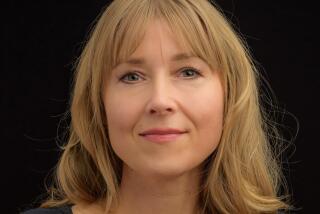Book Review: ‘Wingshooters’ by Nina Revoyr
- Share via
The novel “Wingshooters” is a searing, anguished novel about racial bigotry in a small, insulated Wisconsin town named Deerhorn, where people who were born there tend not to leave. These hard-working, mind-our-own-business townspeople have to contend with a biracial outsider, 9-year-old Michelle, with a Japanese mother and a white American father, who has been left with her paternal grandparents and never retrieved by her cold mother and feckless father.
She comes to love her grandparents, especially Charlie Le Beau. He “was a man, in a vital, fundamental way that grown men simply aren’t today, at least not in the city,” writes the embittered, defensive Michelle, now in her 40s, living in L.A. and looking back on her childhood.
The adult Michelle sometimes comments, but mostly we look through 9-year-old eyes, still innocent and hopeful though already wounded.
From its first pages, a cloud of ever-thickening foreboding hangs over the novel. Children and adults glower at Michelle, call her names, throw stones. Her own grandfather, by some feat of cognitive dissonance, loves her unconditionally even though he is as bigoted as his neighbors.
For a while the girl feels safe. She plays catch with Charlie, goes hunting with him, takes the dog Brett, who becomes an endearing personage in his own right, out for long bike rides. Rumors reach Deerhorn from the outside world: race riots, Vietnam War protests, the disgrace of a president. None of it impinges on the town, although Michelle, or more likely her grown self, muses that life is no longer certain: “[M]aybe it was the town, or the state, or the whole changing, unpredictable country. Maybe it was something diseased or off-kilter in human nature itself.”[
Something most definitely sick begins bubbling to the surface soon enough. As if Michelle’s presence weren’t enough of an unpleasant change in the town’s sense of itself, a black couple move there from Chicago. Mrs. Garrett has been hired to work as a nurse at Deerhorn’s expanding clinic, while her husband will be subbing as fifth-grade teacher.
Michelle is drawn to them, to their graceful ways, their dignity and cheerfulness. She waits, with pity and fear, knowing what they won’t see: that the town has closed ranks and will never accept them.
The atmosphere in her own home has a new tension as the leading men in town convene with Charlie, determined to “do something” about the interlopers. Who’s going to allow filthy black hands to minister to white patients in the clinic?! “They didn’t seem to realize that the danger was not out there, on the other side of the window,” Revoyr writes. “They didn’t realize that the storm was right there in the room, contained in their own minds and hearts.”
Michelle and the reader know something terrible is going to erupt.
What triggers that something is Mr. Garrett’s discovery that one of his students, Kevin Watson, has a web of whip marks all over his back and, by law, reports it. Kevin’s father is Earl Watson, Charlie’s hunting buddy and friend. He is also visibly full of rage, with dark, soulless eyes. What Michelle comes close to understanding and can’t bear to is that Charlie does know the truth but chooses loyalty as his highest good: “Because I always saw Charlie as my defender, as an honorable man who didn’t live in a world that allowed harm to come to children.”
The novel’s horrible climax and final scene are shocking, almost too shocking to be believed as Earl becomes the embodiment of pure evil. The contrast of his twisted nature with the somewhat stereotyped nobility of the Garretts is a flaw in “Wingshooters,” though not a fatal one. Otherwise, the narration and pace of this novel are expertly calibrated as it explores a topic one wishes still wasn’t so current.
Frase is a critic and reviewer.
More to Read
Sign up for our Book Club newsletter
Get the latest news, events and more from the Los Angeles Times Book Club, and help us get L.A. reading and talking.
You may occasionally receive promotional content from the Los Angeles Times.









